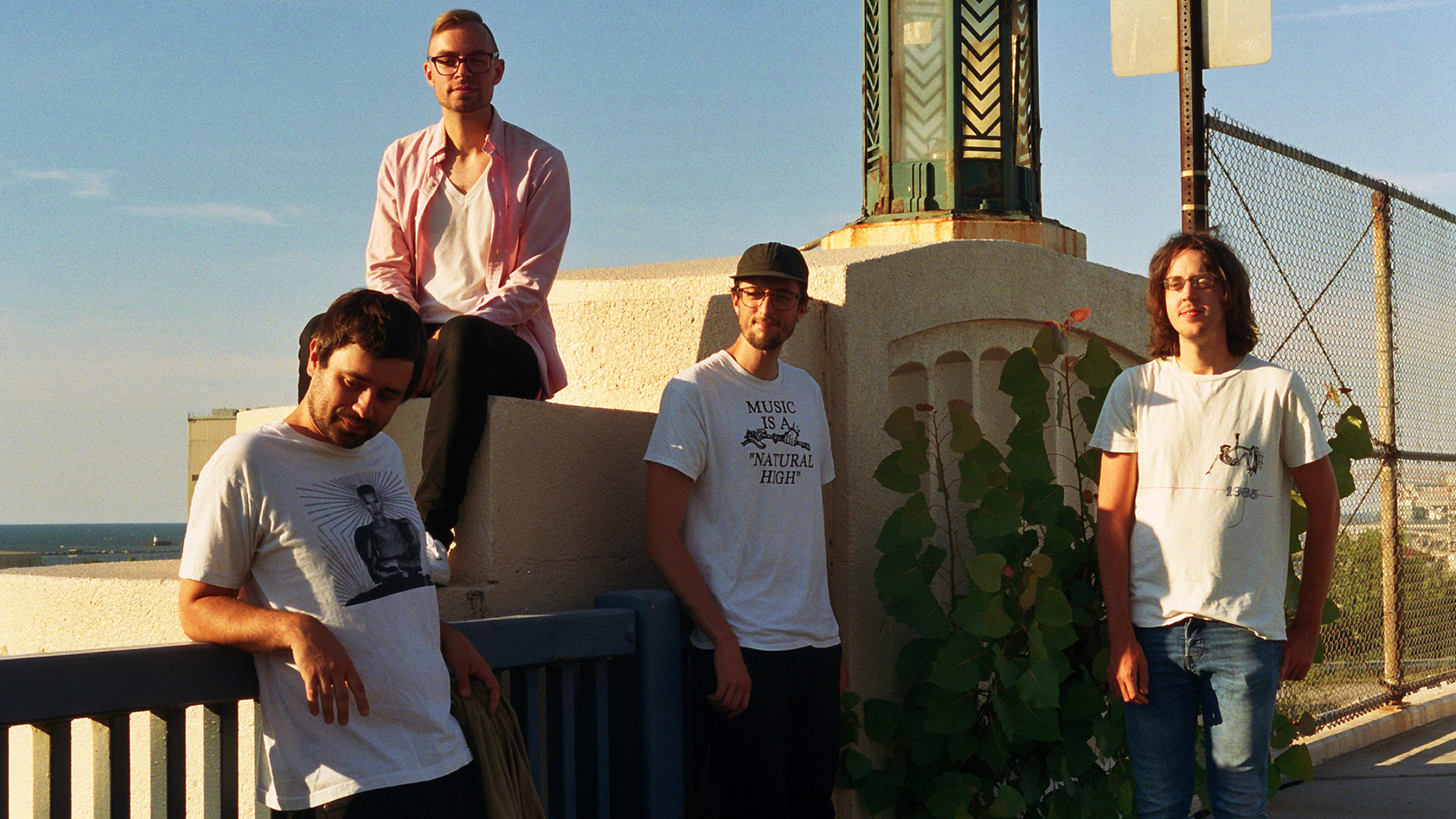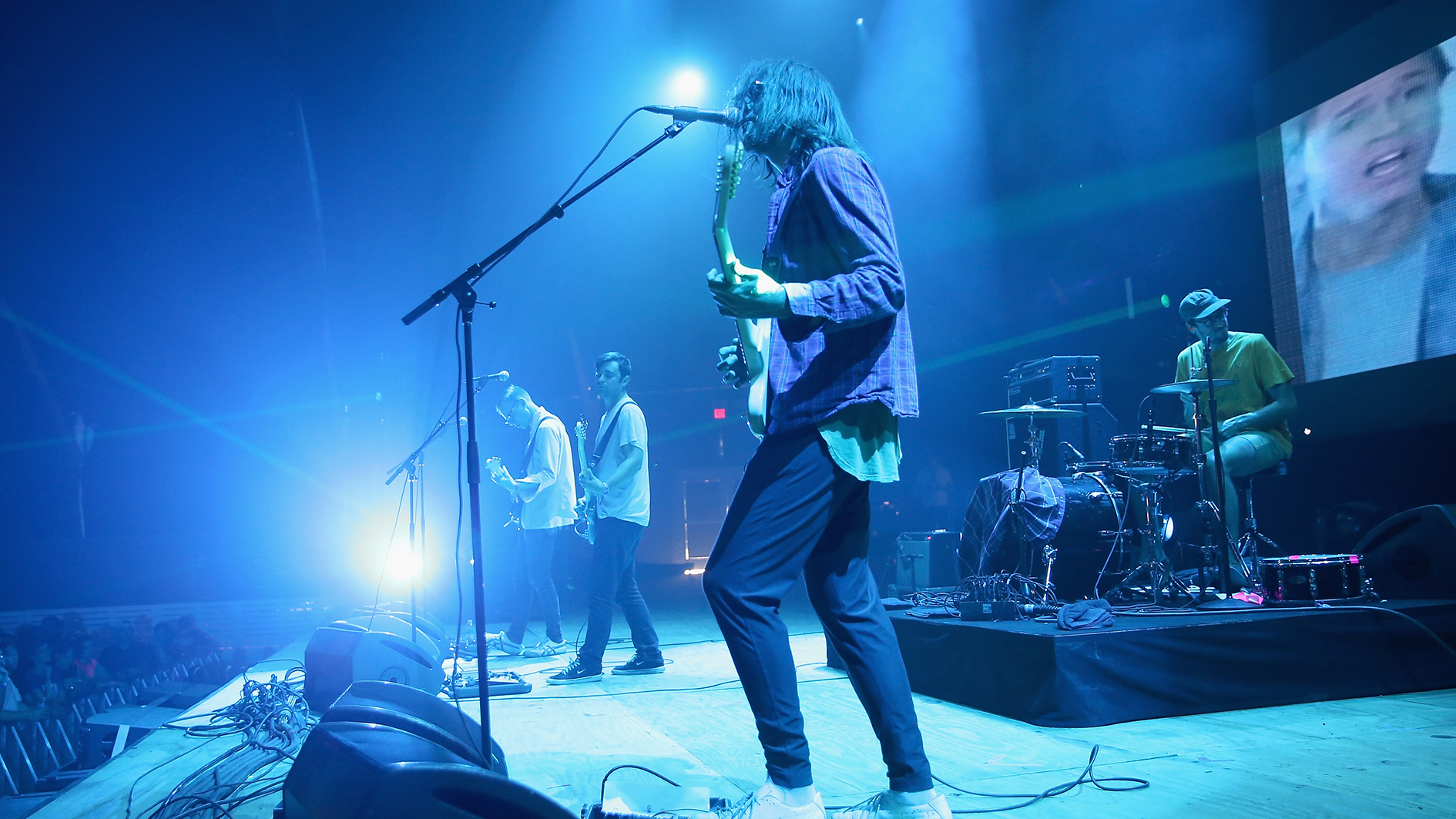Cloud Nothings' Dylan Baldi: “I've always had the philosophy that going into recording or a show, you can't control everything”
The indie-rock stalwart talks acceptance, finally springing for a pedalboard and the band's upcoming album, The Shadow I Remember

Dylan Baldi, the songwriter and guitarist behind Cleveland’s Cloud Nothings has written and released two records across a year when many of us have felt totally paralyzed.
He’s always been prolific but, 10 years on from Cloud Nothings’ debut Turning On, it feels like something has clicked, some new epiphany has struck. 2020’s The Black Hole Understands was a quarantine baby, born in response to an immediate personal challenge to write and record remotely amid the first wave of the pandemic.
t’s dark, rough around the edges but has a softness to it, too, as if Baldi was pulling his punches at a time when most of us were already feeling a little battered.
Now it’s the turn of its bigger brother, The Shadow I Remember (due 26 February), which was actually recorded first, in February 2020, at Steve Albini’s Electrical Audio studio in Chicago.
It represents their first reunion with the cult ‘engineer’ behind 2012’s breakthrough Attack On Memory, but paradoxically feels like the striking of a boisterous new seam.
It is the most varied, melodic and unpredictable of the band’s albums, yet still feels pointed and direct – the sound of a guitar band not worrying about being a ‘guitar band’.
Baldi acknowledges he stuck himself in that rut at one point. “It was a little box that I was in, where I was like, 'I'm in this band that does this thing in one specific way,’” he says. “I think there was almost a burnout phase – that has been surpassed at this point, I’m ready to move on…”
Get The Pick Newsletter
All the latest guitar news, interviews, lessons, reviews, deals and more, direct to your inbox!
It's been really interesting interviewing people and seeing how creativity has ebbed and flowed for different songwriters across the pandemic period. However, it seems like writing has been a constant stream for you, almost an exercise….
“Yeah it kind of is. I was keeping up this rapid pace of writing a song every day and that's how we ended up having enough stuff to release a record, well two records, during this whole quarantine situation.
“So I kind of do it as a compulsion just because if I don't do it, I start to feel like I have no identity.
“For my whole life it's been my hobby and something I've really enjoyed doing and if I just stopped, then I'd have to fill that hole with some other thing and I don't know what I'd fill that with. Rather than confront that, I'll just keep making music. It just keeps things moving.
“When you make this much stuff, obviously not all of it's going to be great and there'll be days where I make something and it's not the best song in the world and I'm like, 'Why did I even do it that day? I should've just done something else...'
“But there's a lot going on right now. It's easier for me to kind of hyper focus in on this one thing that I have to do and that makes it calmer on the inside for me.”
It makes sense in the face of so much upheaval that we need some constants in our lives – to exert some control over the things we can control.
“Yeah. You kind of have to, I think. Otherwise, it starts getting dark real quick!”
I kind of write songs as a compulsion just because if I don't do it, I start to feel like I have no identity
Let's talk about the new record, The Shadow I Remember. Why did it feel right to work with Steve Albini again?
“We have made every record with somebody different up until now, so we've changed producers and engineers every single time. With this little batch of songs, the songs themselves felt like I had been really trying to pair things to almost like a simpler version of the band and I know Steve Albini is really excellent at capturing that – laid out on a page, exactly what something sounds like.
“There's not much decorum, it just is what it is and I thought that would be really helpful given the nature of these songs. That's Albini.”
One of the best things about the new record is the sense of playfulness. As if you're happy to just experiment with the sounds and structures of these songs a bit more. What do you attribute that to?
“Yeah, I think that was part of the creation process of this whole thing. I felt like we had boxed ourselves in, our I had just done it myself, because I'm writing the songs.
“Like I had kind of just taken things to the extreme of where they could go, just making one specific sound over and over. The way I ended up picking the tracklist was which songs were fun for me, which isn't necessarily something I had thought about for the last couple of records.
“With this one, I just really wanted it to feel like we were having a good time when we played the songs. We had driven everything into the ground touring so much and it was just starting to feel like a slog, so I wanted to make sure these songs did not end up that way.”

Many of us will have experienced that sense of ‘slogging it’ with music. How did you go about changing that in your writing and playing?
“I think when I was making the songs, things that I think in general I would have thrown away I kind of just followed. I make songs just by playing guitar and not thinking about it too hard and eventually a little riff or something comes out and that'll be the basis of the song.
“If I ever played one that sounded new to me or exciting in a way or not exactly like old Cloud Nothings, I would take that riff as a starting point and try to do other new things from there.
“There's things like the end of A Longer Moon where there's a little hammer on guitar part that goes on for a long time and I remember making that and thinking, 'What if I just did this for a long time?' I did it and sent the demo to Jason and he was like, 'This part's sick!’ So I wanted to kind of follow those impulses a little more.”
Tell me about the guitars on this record. What has been your go to?
“I am 99% sure I only used one guitar the whole time! It’s a Firebird that I got from Chicago Music Exchange, three or four years ago, which is a great, great guitar and music store in Chicago.
“It's all white and it has three gold pickups, like three humbuckers in it and I remember I just thought, ‘That guitar looks great, I almost don't even care what it sounds like!' It just looks incredible. I bought that guitar a while ago and that kind of has been the mainstay for the last couple of records and the last few years.
There was a period of time prior to about 2016/2017 where I was just trying to copy Greg Sage from The Wipers
“Then Steve Albini has a lot of weird pedals and stuff, just little boxes that don't have names or there's just no information on these things, so it's like 'I guess I'll use some of these'.
“There's a couple of little things like that but for the most part, I used an overdrive pedal and maybe a fuzz and that was pretty much it. Our other guitarist Chris uses a chorus and a little Memory Man or something, but as far as the actual sounds it's pretty much coming straight from us.”
With the Firebird, it's unusual to find someone who tours as much as you do with one guitar. What is it that works for you about the instrument? Presumably you did like the sound in the end...
“Yeah, I do. Firebirds are bigger and heavier, the neck is wider, so it’s kind of a chunky thing and these big, thick chords feel natural coming out of a guitar that actually has some more weight to it, so there's that aspect of it. I have an old 60s SG Special that I use.
“Basically there was a period of time prior to about 2016/2017 where I was just trying to copy Greg Sage from The Wipers, so I use these old Ampeg amps and I have the rare white/gold SG Special that was from '67.
“All this really cool vintage stuff but if you tour with that stuff, it breaks all the time, so another thing behind getting the Firebird was just wanting a new guitar that wasn't going to break all the time. It's been good at that – it hasn't broken once.”

What about on the amplifier side of things?
“That’s another one where I’ve used almost the same amp for a long time too. Outside of the little Ampeg stint I had, I’ve used this '60s Fender Bandmaster. It has a giant oversized cabinet that I think someone must have originally used for bass.
“It’s a huge cabinet with two tiny speakers in it, these two ten inch speakers. It looks ridiculous. For some reason, it works really well with this Bandmaster head. That’s what I generally use and I use that on tour too. It can withstand travel.”
Do you use much on the floor when you’re touring?
“Even a pedalboard is something that I only bought recently. I just used to string a couple pedals in front of me and they would move around for the whole show and I would be like ‘this is annoying’, so I finally sprung for a pedal board a couple years ago.
“During the shows, I have almost exclusively stuck to the MXR Carbon Copy. I like that delay. I have one of those [TC Electronic] Hall of Fame reverb pedals that I use sparingly.
I've always had the philosophy that going into recording or a show, you can't really control everything
“Then I have an ever-changing rotation of a fuzz pedals. There’s always a new one. I used to use this '70s MXR Distortion+, the mustard yellow pedal, and that sounds incredible.
“But it doesn’t have an LED, so you don’t know if it’s on and it’s only battery powered too, so you can’t plug it into the chain, so you don’t know if it’s going to turn on or turn all your pedals off!”
You seem quite easy-going when it comes to gear. What do you look for?
“I'm kind of easy going in a way. For some reason I've always had the philosophy that going into recording or a show, you can't really control everything. I've never had the luxury to do that and also I don't really think like that.
“My thought is always like I'll play something and be like, ‘Ah! I guess that's what it sounds like! Let’s go with that!’ You just have to accept it. I feel that way about sound-checks, too, looking back on it – sometimes we would sound-check and it'd sound insane and I'd be like, 'Well... I guess we'll work with that!’ [laughs]
“I don't know why I've always felt that way but it does make things easier. Maybe it hasn't always served the record – to not step in there and be like 'let's tweak some things' – but for others it’s worked really well and leaves things more natural.”

Worrying about things you can’t control is the ultimate cause of stress – which seems particularly evident at the moment.
“Totally. The idea applies outside of guitar land, too! Another thing that happens with your playing, if you just sort of accept things the way they are, is you end up almost having your own approach. It helps develop a personal sound or style.
“You can never exactly copy something, you never quite get there, but when that urge to copy [and tweak] kind of fades away, you end up with your own approach.”
How are you feeling about this record going out into the world without the touring element and that constant cycle? How do you think you will view it in that context?
“I would like to just forget about it! To get through this and put it behind me and hopefully, eventually, we can tour again. That is why I started the band. I just wanted to get out of where I lived.
“I had been in a suburb of Cleveland for 18 or 19 years at that point and I was like, you know what, 'If I go to college right now in Cleveland, all I am going to see my whole life is, quite possibly, Cleveland.' So I wanted to go and do something.
“That was and still is a really important part of the band to me and with like music in general. The most important things that come out of music are like the ability to cross culture divides and bridge gaps that way and get people together, who normally would never have that experience or chance to be together.
“Taking that whole aspect of music away and forcing it all online is obviously in the public health interest at the moment but it's also depressing. Community is a really important part of music so when that part is allowed to return, I'm excited for that."

Matt is Deputy Editor for GuitarWorld.com. Before that he spent 10 years as a freelance music journalist, interviewing artists for the likes of Total Guitar, Guitarist, Guitar World, MusicRadar, NME.com, DJ Mag and Electronic Sound. In 2020, he launched CreativeMoney.co.uk, which aims to share the ideas that make creative lifestyles more sustainable. He plays guitar, but should not be allowed near your delay pedals.
“I said, ‘Let’s get Hendrix to play on it.’ His manager said, ‘Jimi’s playing shows back-to-back.’ So we got Jimmy Page”: The hit ’60s single that was supposed to feature Jimi Hendrix… but ended up with Jimmy Page
“It was tour, tour, tour. I had this moment where I was like, ‘What do I even want out of music?’”: Yvette Young’s fretboard wizardry was a wake-up call for modern guitar playing – but with her latest pivot, she’s making music to help emo kids go to sleep








![John Mayer and Bob Weir [left] of Dead & Company photographed against a grey background. Mayer wears a blue overshirt and has his signature Silver Sky on his shoulder. Weir wears grey and a bolo tie.](https://cdn.mos.cms.futurecdn.net/C6niSAybzVCHoYcpJ8ZZgE.jpg)
